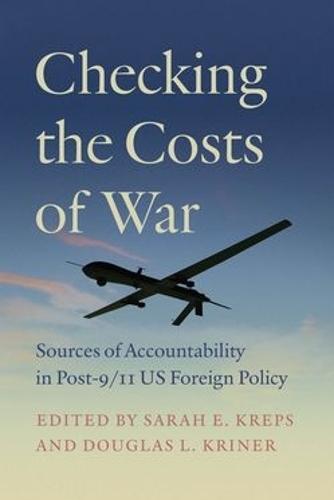Overview
A thorough reassessment of how domestic factors do and do not constrain the use of American military force abroad in the early twenty-first century. More than two decades have passed since the September 11th terrorist attacks resuscitated debates about the ""imperial presidency"" within the United States. During that same time, the United States has fought costly and inconclusive wars in Iraq and Afghanistan, pivoted to the Pacific to counter China, and pulled its gaze back to Europe and the Middle East in response to wars in Ukraine and Gaza. Moreover, new technologies and ways of funding and staffing wars have made the costs of war less visible to the public while polarization has increased and a new legal doctrine of presidential power has gained force. Against this backdrop, Checking the Costs of War reassesses how domestic factors have both constrained and failed to constrain the use of military power across different contexts and over time. Richly empirical chapters explore the varying effects of different kinds of potential checks: legislative, public opinion, and bureaucratic. Collectively, chapters offer new insight into the prospects for war and peace today.
Full Product Details
Author: Sarah E. Kreps ,
Douglas L. Kriner
Publisher: The University of Chicago Press
Imprint: University of Chicago Press
Weight: 0.454kg
ISBN: 9780226834146
ISBN 10: 022683414
Pages: 400
Publication Date: 07 October 2025
Audience:
Professional and scholarly
,
College/higher education
,
Professional & Vocational
,
Postgraduate, Research & Scholarly
Format: Hardback
Publisher's Status: Active
Availability: Awaiting stock

The supplier is currently out of stock of this item. It will be ordered for you and placed on backorder. Once it does come back in stock, we will ship it out for you.
Reviews
""Checking the Costs of War is an excellent volume by the leading scholars in the study of American institutions and foreign policy. By assessing the state of political division in the United States and the evolving nature of military conflict, the book provides an innovative framework with which to understand checks on presidential power after 9/11. The book is a must-read for scholars of American foreign policy."" -- Jon C.W. Pevehouse | University of Wisconsin-Madison ""When presidents craft foreign policy and contemplate military action abroad, what domestic forces stand in their way? Quite a few, the essays in this important volume show. In different ways and under varying conditions, partisan opponents, intra-party factions, a recalcitrant bureaucracy, and a public weary of war periodically impede presidential ambitions to refashion international relations. Two presidencies—one domestic, the other foreign—may still exist. But the evidence and arguments herein leave the distinct impression that their differences are collapsing."" -- William Howell | coauthor of ""Presidents, Populism, and the Crisis of Democracy""
""Checking the Costs of War examines the factors influencing the ability of US leaders to engage in a range of fiscally and politically costly foreign policy and military actions in the absence of effective constraints on the part of groups such as the legislature, the federal bureaucracy, and/or the public."" * Choice * ""Checking the Costs of War is an excellent volume by the leading scholars in the study of American institutions and foreign policy. By assessing the state of political division in the United States and the evolving nature of military conflict, the book provides an innovative framework with which to understand checks on presidential power after 9/11. The book is a must-read for scholars of American foreign policy."" -- Jon C.W. Pevehouse | University of Wisconsin-Madison ""When presidents craft foreign policy and contemplate military action abroad, what domestic forces stand in their way? Quite a few, the essays in this important volume show. In different ways and under varying conditions, partisan opponents, intra-party factions, a recalcitrant bureaucracy, and a public weary of war periodically impede presidential ambitions to refashion international relations. Two presidencies—one domestic, the other foreign—may still exist. But the evidence and arguments herein leave the distinct impression that their differences are collapsing."" -- William Howell | coauthor of ""Presidents, Populism, and the Crisis of Democracy""
""When presidents craft foreign policy and contemplate military action abroad, what domestic forces stand in their way? Quite a few, the essays in this important volume show. In different ways and under varying conditions, partisan opponents, intra-party factions, a recalcitrant bureaucracy, and a public weary of war periodically impede presidential ambitions to refashion international relations. Two presidencies--one domestic, the other foreign--may still exist. But the evidence and arguments herein leave the distinct impression that their differences are collapsing.""--William Howell coauthor of ""Presidents, Populism, and the Crisis of Democracy"" ""Checking the Costs of War is an excellent volume by the leading scholars in the study of American institutions and foreign policy. By assessing the state of political division in the United States and the evolving nature of military conflict, the book provides an innovative framework with which to understand checks on presidential power after 9/11. The book is a must-read for scholars of American foreign policy.""--Jon C.W. Pevehouse University of Wisconsin-Madison
Author Information
Sarah E. Kreps is the John L. Wetherill Professor in the Department of Government at Cornell University, where she is also an adjunct professor of law and the Director of the Cornell Tech Policy Institute. She is the author of five books, including, most recently, Social Media and International Relations. Douglas L. Kriner is the Clinton Rossiter Professor in American Institutions in the Department of Government at Cornell University. He is the author of five books, including, most recently, The Myth of the Imperial Presidency: How Public Opinion Checks the Unilateral Executive.



